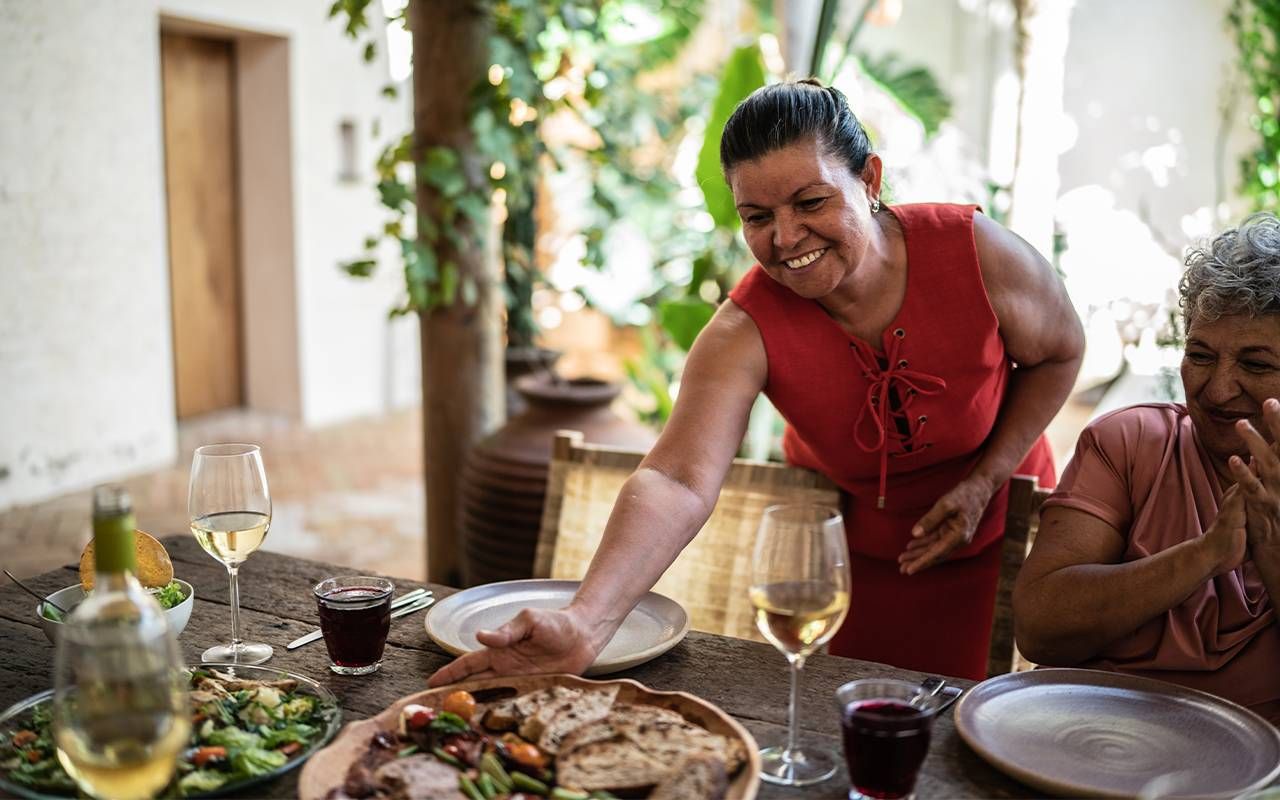When Friends Are Family
A foundation of shared interests, trust and affection for each other informs these important connections that may be closer than family relationships
Over the summer, my husband and I had a small party in honor of our oldest daughter's engagement. The celebration was at her Aunt Andrea and Uncle Spencer's house. The location was an ideal midpoint for our guests. In addition, over the years, we have celebrated so many occasions, from holidays to birthdays, in their home, so this was a perfect spot to celebrate this happy event.

Although my kids have always referred to Andrea and Spencer as their aunt and uncle, we are not related. Not genetically or through adoption or marriage.
But we do share a special connection. It's friendship, but it is more than that. Blood-related or not, to us, in our hearts, we are the definition of family.
Family Matters
Psychiatrist Gail Saltz, associate professor of psychiatry at the New York-Presbyterian Hospital Weill-Cornell School of Medicine and host of the "How Can I Help?" podcast from iHeartRadio, says, "Family is valuable. These relationships are long-standing and intimate. Positive family relationships can have both mental and physical health benefits."
Unlike family, people do get to choose their friends.
But while family can be wonderful, it can also be complicated. Not all families have positive, healthy relationships among all of their members. Problems in a family can range from mildly annoying to emotionally toxic.
"You don't get to pick your family," says Saltz. "Family is based on nature. You are tethered to these people by biology whether you like them or not."
Bonds of Friendship
Unlike family, people do get to choose their friends. Usually friendships develop over time. There is a foundation of shared interests, trust and affection for one another.
Yvonne Ransel, 74, of Indiana, says, "I have so many close friends. Some I have known for over forty years, others I have met more recently, but the bonds are also very strong."
"I don't have as much in common with my siblings."
Ransel has two siblings, but in many ways, she doesn't feel as connected to them as she does to her friends. Ransel explains, "I don't have as much in common with my siblings. I am the oldest of three. When I left home for college in another state, my younger sister was only 14 years old. We love each other but don't really know each other as adults."
This disconnect was evident when Ransel's husband passed away in July 2021. She says, "My friends and neighbors were at my house immediately, bringing food and taking care of me. My brother and sister came a few days later. They had good intentions but just weren't sure what to do. They didn't help me in the same way that my friends did."
The Difference Between Family and Friends
In a perfect situation, people have strong family connections as well as strong friendships in their lives. According to Saltz, "It shouldn't be a contest between the two. These are different relationships. Friends don't necessarily have to be a replacement for family. There is space for both."
But sometimes, families can feel territorial. The saying "blood is thicker than water" is a proverb meaning that familial bonds will always supersede and be stronger than any other relationship. Loyalty to family is more important than loyalty to anyone else.
When my kids were little and my mother would hear them refer to Andrea and Spencer as their "aunt and uncle," she would get frustrated. In private, she explained that it hurt her that my children used this term of endearment for my friends when they had "real" aunts and uncles.
I didn't see it that way. My brothers were both younger, single and in different stages of their lives. Beyond the familial title, they weren't interested in having a more active role in my kids' lives. I wasn't replacing them with my friendship but rather filling a void and enhancing my life.
My mother's insistence that family come first did not have the impact she wanted. It probably drew me even closer to my friend. Saltz says that is often the case. "Families with strict rules about who is in the clan usually lose out," she says. "They think that excluding outsiders will make them feel included, make the family closer, but it tends not to work that way."
Instead of seeing it as a comparison or competition between friends and family, it usually works better to create an inclusive environment.
"Love isn't finite. You can include people who aren't family in family-type events and it will add, not subtract, from your life," Saltz says.
Dealing with Conflict
People may allow behavior in a family relationship that wouldn't be in a friendship. "I let things slide more with my siblings than my friends," says Ransel. "I don't want to make waves, so I don't speak up. And when I do, it often results in more conflict rather than making things better."
Saltz explains, "Friendships don't have the same tether as family. Friendship relationships tend to be more cautious with each other. They know that friendship is a choice and that you can leave the relationship with less personal guilt or impact on other family members."
"I plan to celebrate the holiday with friends in town who are like family."
The layered history of families (such as sibling rivalries, parent/child conflict) can find its way into present discord. Ransel says, "It feels like with my siblings, disagreements are always seen as 'my fault' because I am older or because I moved away as an adult and they stayed in our hometown with our parents."
There is an acceptance that friendships may end at some point, either fading or due to conflict. Saltz says, "Most people don't have the same friends their whole life. Although the end of a friendship can be sad, we usually don't judge people as harshly when they are no longer friends with someone."
But family is supposed to be forever. Saltz says, "People will torture themselves to the point that it is destructive to them. Not talking to a family member or severing ties altogether is less acceptable than ending a friendship."
Friends, Family and Holidays
I remember watching the television show "Friends" when I was younger. Each year there would be an episode where all six adult characters celebrated Thanksgiving with each other. I found the scenario odd and unrealistic. At the time, I couldn't imagine I would ever celebrate with friends instead of my parents or brothers. Why would they be together and not with their own individual families?
Now in my 50s, I understand why that might happen. Families don't live near each other and may not be able to get together for the holidays for a wide range of reasons (work obligations, financial constraints, COVID concerns.) Or they may just not want to spend the holidays with family.
If you traditionally spend the holiday with family and this year you want to make a different plan, let your family know your decision. Saltz says, "Let them know it's not about valuing your friends over your family but that it won't work this year. Thoughtfully explain your reasoning. Understand that they may not react well and honor their feelings."
Ransel plans to spend Christmas with her adult children, but for Thanksgiving, she will spend the day with close friends in her community.
She says, "I plan to celebrate the holiday with friends in town who are like family. I am thankful that I have such wonderful friends."


